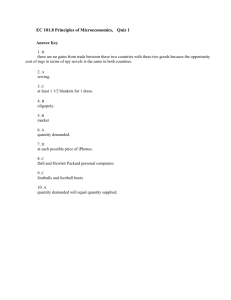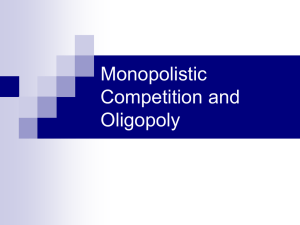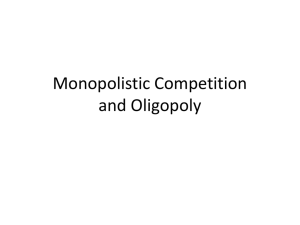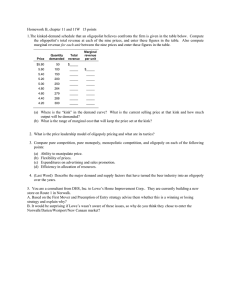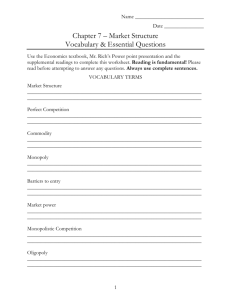Oligopoly Theory
advertisement
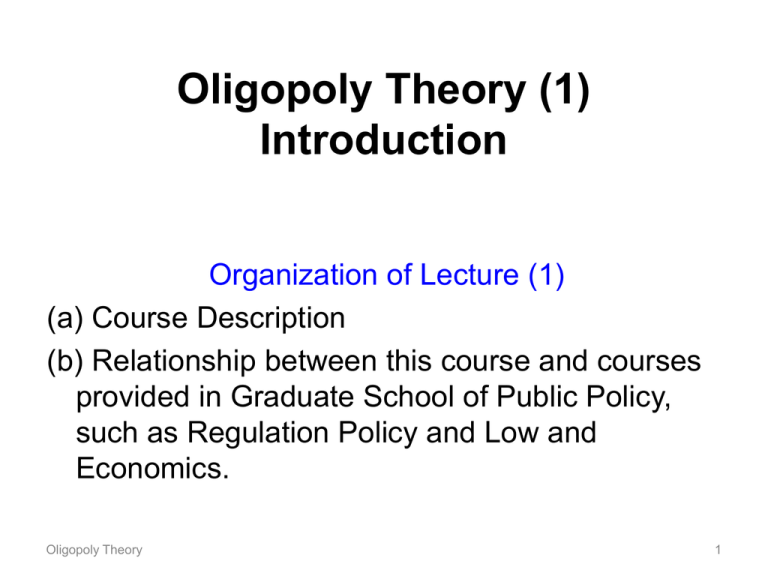
Oligopoly Theory (1) Introduction Organization of Lecture (1) (a) Course Description (b) Relationship between this course and courses provided in Graduate School of Public Policy, such as Regulation Policy and Low and Economics. Oligopoly Theory 1 Most Important Question Are there any students at this class who can not speak Japanese? If at least one UTIPE and non-Japanese speaking student participates in this class, the lecture is presented in English. Oligopoly Theory 2 Materials Visit http:// dbs.iss.u-tokyo.ac.jp/~matsumur/OTEN.html (English version) or http:// dbs.iss.u-tokyo.ac.jp/~matsumur/OT2013.html (Japanese version) You need not remember this address because you will reach theses if you follow the links of my HP. You can obtain the files of reading list, slides presented in this class, and so on. I will upload files I will use in the class by the end of previous week (Saturday night). Oligopoly Theory 3 Purposes of This Lecture (a) To learn basic models for analyzing oligopoly markets such as Cournot, Bertrand, Stackelberg, Hotelling, and so on. ~ Welcome the students who are interested in theoretical (applied) microeconomics such as Industrial Organization, Regional Science, Contract Theory, Law and Economics, Labor Economics and so on, especially who are Doctor course students or Master course students who are planning to go to Doctor course, but not limited to those students. Oligopoly Theory 4 Purposes of This Lecture (b) To obtain some ideas for writing academic papers of Industrial Organization, Regional Science, and so on. Ikuo Ishibashi (Associate Professor, Osaka University) IJIO(2003, 2008), EER(2006) Daisuke Shimizu (Professor, Gakushuin University) EL(2002, 2005), EB(2003), SEJ(2005), RSUE(2005) PiRS(2006), JER(2008),BER(2013) Tomohiko Kawamori (Associate Professor, Osaka University of Economics) EL(2004), ET(2009) Daisuke Hirata (Graduate Student, Harvard University) BEJTE (2009), ORL (2010), JoE (2011) Oligopoly Theory 5 Purposes of This Lecture Takeshi Murooka (Graduate student, UC Berkley) EL(2012), ORL(2011) Minoru Kitahara (Associate Professor, Osaka City University) JER(2006), JoE(2006), AEP(2008), MS(2013) Susumu Cato (Associate Professor, Tokyo Metropolitan University) EB(2008a,b,c), MS(2011), BER(2012), EM(2011,2013), JoE (2012), JITE (2012), EL (2013), FA(2013) Takeaki Sunada (Graduate Student, The University of Tokyo) EL(2013) Oligopoly Theory 6 Purposes of This Lecture Kazuhiko Kato (Professor, Asia University) EB(2006), JoE(2006, 2013), EL(2007) Akira Ogawa (Associate Professor, ICU) EB(2006), JoE(2009), AEP(2010), ORL(2011), EL(2012) Hiroaki Ino (Associate Professor, Kwansei Gakuin University) ET(2009), JoE(2010), IER (2012) Oligopoly Theory 7 Purposes of This Lecture (c) To obtain some examples which can be used for writing more theoretical papers (such as pure game theory or microeconomic theory), or empirical papers. (d) To learn real world examples in Japanese economies~ not suitable. Economics of Regulation and Law and Economics presented at Graduate School of Public Policy must be better (but these are presented in Japanese). Oligopoly Theory 8 Requirement (a) Basic knowledge of Microeconomic Theory and Game Theory is indispensable. (b) Basic knowledge of Game Theory is indispensable. ~If you do not know basic concepts of game theory such as `subgame perfect Nash equilibrium’, you should take this lecture after taking Core Course Microeconomics. (c) Very preliminary technique of optimization is required. If you do not know `first-order condition’ and `second order condition’, you should not take this lecture. (d) Basic knowledge of Industrial Organization is not required. 9 Oligopoly Theory Reading Assignment No reading assignment. I do my best to present clear descriptions of the standard models of oligopoly. I think that all students who have sufficient knowledge on graduate level of microeconomics and game theory can understand the course without reading any papers before the class. Reading list exists (1) for the convenience of the students who are interested in some specific topics after the class, and (2) to make sure that what paper I explain in the lecture (in the slide, only the names of authors and the publication year appear). Oligopoly Theory 10 Schedule(1) 1 2 3 4 5 6 7 Course Description Quantity-Setting Competition Price-Setting Competition and Contestable Market Theory Market Structure and Competitiveness of the Market First-Mover Advantage and Second- Mover Advantage Endogenous Timing in Oligopoly Multi-Stage Strategic Commitment Games Oligopoly Theory 11 Schedule(2) 8. Product differentiation and spatial competition 9. Entry deterrence 10. Excess competition and excess entry 11. Collusion 12. Vertical control, vertical integration and foclosure 13. Competition in quality 14. Mixed oligopoly Oligopoly Theory 12 Grading ・No written examination. Grade is based on class participation. ・I will never provide grade C. In this case, I will provide D. ・Comments in the class are welcome. Students are required to attend the class after agreeing that they are expected to make contributions to the class and I sometimes ask the participants to express their own opinions. ・I prepare some quizzes in the class to make sure that the students understand the lecture. Oligopoly Theory 13

